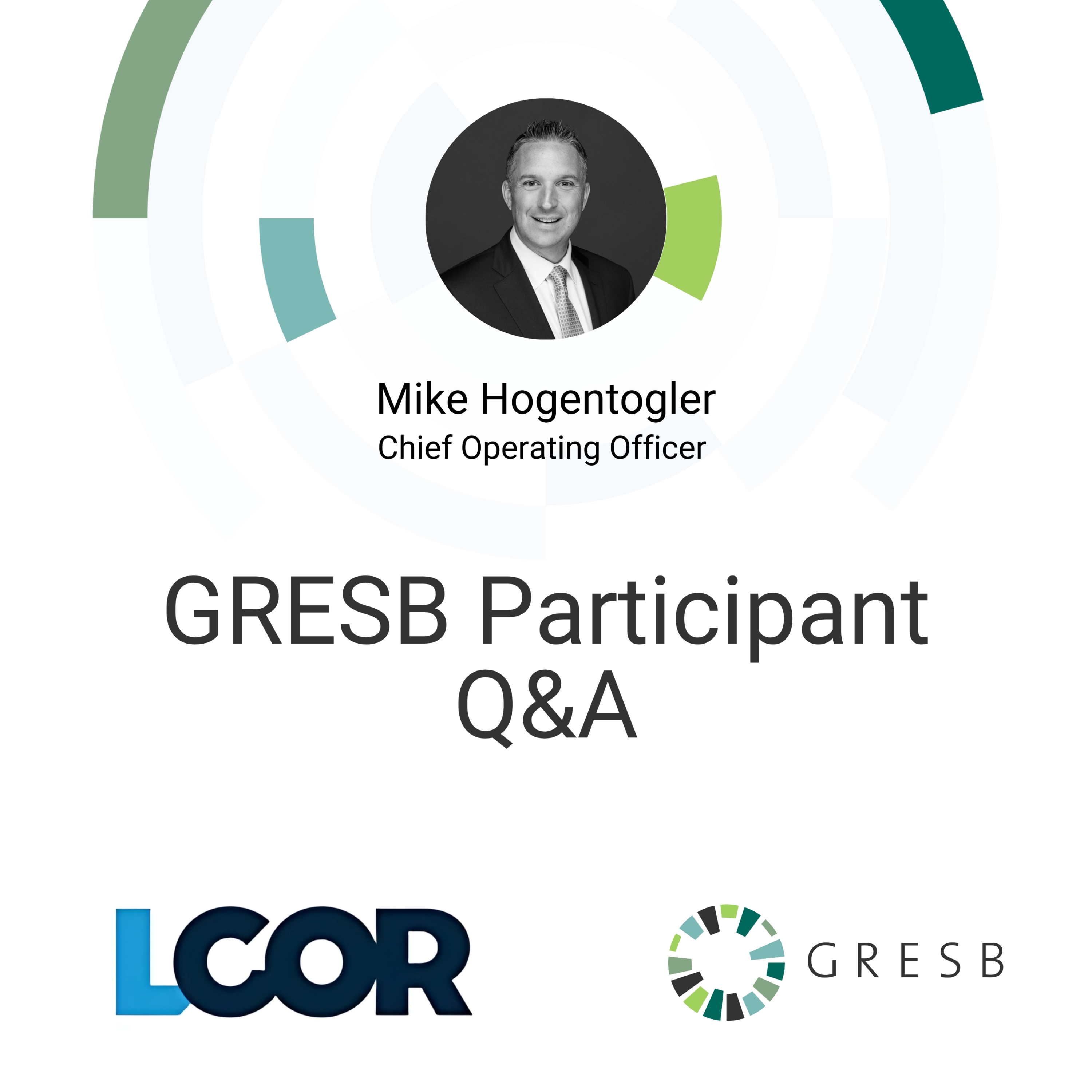About LCOR
With nearly 50 years of experience, LCOR is a fully integrated multifamily development, investment, and operating company specializing in ground-up core urban development within key gateway Metropolitan Statistical Areas (MSAs) in the eastern U.S.

Introduction
- Name: Mike Hogentogler, Chief Operating Officer
- Company: LCOR
- GRESB Assessments: GRESB Real Estate Assessment (Management, Performance, & Development)
- AuM: USD 4.4 billion
- Region: North America
- Starting year with GRESB: 2022
- GRESB Partner: breea
How did LCOR’s sustainability journey begin and what was LCOR doing prior to joining GRESB?
Our sustainability journey began long before joining GRESB. We started pursuing green building certifications over a decade ago to ensure our communities met high environmental standards. We then created internal Sustainability Committees to improve employee engagement around sustainability and champion our initiatives. As our focus shifted to performance, we benchmarked 100% of our portfolio in ENERGY STAR Portfolio Manager and teamed up with Conservice and Measurabl for ongoing data management. And in 2022, we partnered with GRESB Partner breea (sustainability advisors) to expand and execute our enterprise-wide sustainability strategy, guide us through the GRESB Assessment process, and help us publicly market our achievements in our annual sustainability report.
What motivated LCOR to start participating in the GRESB Assessment?
After formalizing our sustainability strategy, participating in GRESB was a natural next step. Driven by investor priorities, GRESB provides a sustainability reporting framework that has helped us identify material KPIs, establish targets, track performance against industry benchmarks, and strategically allocate resources to create the most value. GRESB has also strengthened our understanding of sustainability, which has streamlined investor requests and improved overall investor engagement around shared goals.
What challenges and opportunities did you uncover when beginning the GRESB Assessment process?
As a growing organization, we needed a partner who could strategically guide us through the GRESB Assessment process while keeping us informed on all things sustainability as the industry evolved. We partnered with breea to help us prepare for the GRESB Assessment and ensure we put our best foot forward in our inaugural response and each year thereafter.
When beginning the GRESB Assessment process, we focused on the low-hanging fruit to quickly build out our sustainability program, like policy development, utility benchmarking in ENERGY STAR Portfolio Manager, and setting near-term targets. With a focus on year-round continual improvement and the help of our partner breea we have improved our funds’ average GRESB Scores by 15 points since our inaugural response in 2022.
What are the most important insights you have uncovered from the GRESB Benchmark and data?
For starters, the value of accurate data cannot be overstated—reliable data empowers us to make informed decisions, track progress, and accurately report to our investment partners. GRESB has also helped us better understand where to allocate resources most effectively to improve environmental performance, climate resiliency, and boost the bottom line. And last but certainly not least, GRESB has helped us better differentiate ourselves in the market and open the door to new investment partnerships.
How has LCOR’s sustainability strategy evolved since participating in GRESB?
GRESB has taken our sustainability program to the next level. After targeting low-hanging fruit GRESB improvement opportunities and identifying strategies for long-term growth, we have renewed our commitment to developing and operating resilient, high-performing communities. LCOR has become an industry leader in the deployment of new property technologies that continue to generate operational efficiencies, lower operating costs, and enhance our customer experience.
In 2024, we delivered 1515 Surf Ave in NYC, which has the largest geothermal heating and cooling system in the state of New York. We have since committed to installing community-scale geothermal systems at three additional development projects in the New York City metro area. And finally, in collaboration with our investment partners, we recently performed asset-level climate resiliency assessments to identify opportunities to bolster resilience and harden our assets to climate change.
How has LCOR adapted its approach to address the unique sustainability challenges and opportunities that arise from operating in the residential (multifamily) real estate sector?
We are an early adopter of sustainable construction techniques and provide future-focused technologies in our buildings. Operationally, LCOR has become an industry leader in the adoption and deployment of new property technologies including EV charging, utility data management software, access control, and smart home controls, resulting in operational efficiencies, reduced expenses, and an enhanced resident experience.
These efforts are driven by increasing regulatory requirements, rising resident expectations for smart and sustainable living, and the growing importance of energy efficiency in long-term asset value. Multifamily properties present unique challenges, such as balancing tenant comfort with energy efficiency, managing shared resource consumption, and ensuring long-term resilience. Our approach addresses these by integrating cutting-edge technology that enhances sustainability while improving operational performance.
Most recently, we launched our Innovative Living Strategy in late 2024 which targets the acquisition of best-in-class, recently developed properties for strategic retrofitting with LCOR’s full technology package to deliver a modern, connected living experience and operational efficiencies.
In 2025, GRESB introduced an optional assessment module with indicators specifically tailored to residential real estate. Are there specific indicators or insights you anticipate being particularly valuable or that could help drive meaningful impact?
We are particularly interested in the RES2 “Monitoring of performance metrics on local infrastructure” and RES5 “Affordable housing practices” indicators. Since LCOR’s inception, we have focused our development efforts in dense, urban, walkable, previously developed, transit-oriented locations to encourage active and low impact living. This has allowed us to strengthen connections between people and places, while enriching the surrounding communities. We also strive to incorporate affordable housing units in our development projects by collaborating with local municipalities and actively pursuing available incentives. We hope these new indicators will help set industry benchmarks around affordable housing and low-impact development, and drive meaningful progress.